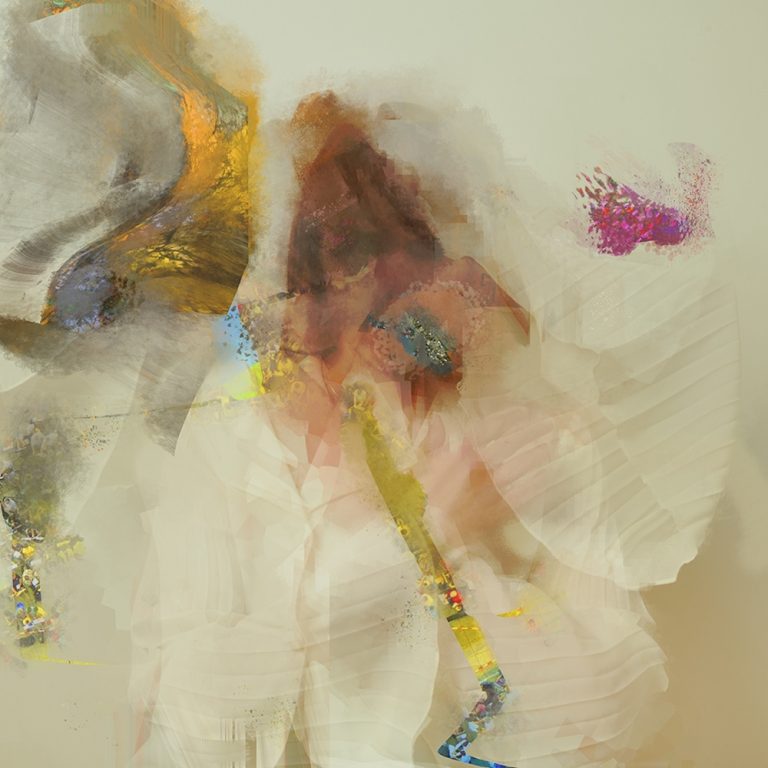“How can I explain myself?”
That’s the question that introduces Jenn Wasner’s new album under her Flock of Dimes alias. It’s an interesting one, especially coming from an artist known for her potent but slightly obtuse lyricism. Her many albums with main gig Wye Oak prove that she is a sharp, if elusive, lyricist, communicating raw feeling through imagistic poetry and abstract phrasing. It’s almost like what Justin Vernon has become known for, except a little more lucid than that: despite its Delphic nature, Wasner’s writing has never felt alien or unapproachable.
So, to ask such a self-reflexive question at the start of her first solo album since 2016’s under-appreciated If You See Me, Say Yes, seems a promising place to begin. It’s gently ironic that she follows up this line with “I have two heads inside my mouth,” thereby not really clearing anything up. But don’t let this playful imbalance between the grounded and the ambiguous fool you: Head of Roses, also Wasner’s Sub Pop debut, is her most direct record yet, full of what is definitely her clearest, most emotionally stirring work to date.
After the robotic-twin voicing of sparse opener “2 Heads”, there comes a familiar sound: Wasner’s roaring guitar. While it was quite a scandal (in the silliest of senses) when Wasner mostly exchanged her trademark axe for an electric bass on Wye Oak’s 2014 album Shriek, she has since proven that she can, quite ably, tackle whatever she puts her hands on. With its almost shoegazey blur of guitars and percussion, and those half-buried vocals fighting for air, “Price of Blue” is the most Wye Oak-adjacent piece here. It’s also one of the few moments on the record that doesn’t quite land: it’s a little overlong, and then fizzles out sort of abruptly. But after this comes a slew of Wasner’s strongest songs yet.
Early single “Two” is a sparkly little pop gem, with springy guitars and synths and even cello courtesy of Wye Oak bandmate Andy Stack (which, who knew?), atop some lovesick lyrics like “Can I be one? / Can we be two?” All seems rather pleasant, until you hear Wasner singing lines like “We’re all just wearing bodies / Like a costume til we die.” This dichotomy between lightness and darkness pervades much of the album, bubbling up in subtle ways, like an ebbing tide. Wasner wrote much of the material for Head of Roses in the throes of emotional distress, and that’s traceable both in the lyrics and the music.
Co-produced by Sylvan Esso’s Nick Snaborn, whose trademark wizardry shows up in very subtle but noticeable ways across these 10 songs, Head of Roses is possibly the gentlest album Wasner has ever spearheaded. Pianos, soft keys, and gentle guitars take center stage much of the time. The lovely “Walking” has an early-00s Modest Mouse vibe to it with swaying pedal steel and close Wasner harmonies, as she asks things like “Are we anywhere at all?” The stark “No Question” sees Wasner singing, awash in heavenly reverb and echoes, over a rippling and distorted piano figure; eventually, some truly beautiful horns enter, bringing with them a shard of sun through the clouds.
Even sparer is “Hard Way”, a minimalist stunner. Alongside a profoundly simple keyboard progression, Wasner sings, again alongside a robotic twin, about those moments when you choose the harder path because you’re avoiding facing a problem head on. Wasner delivers a moving, heartbreaking melody, and even the squelching synths in the bridge can’t derail the loveliness of the tune. Equally minimal is “Lightning”, featuring a mesmerizing, reverb-drenched acoustic guitar lick over which Wasner sings gently observant lines like “I forgot who I am / I watched it happen / But I can’t understand,” before a saxophone interrupts the calm, as soft as rain, as if trying to make as little noise as possible. It’s a gorgeous moment of stillness, and the album is full of small moments like this, reflecting the small epiphanies and tensions of life.
On the best song here, “One More Hour”, a pop song in miniature, Wasner sings out, amongst a choir of herself, “I’m paying attention now!” That could be the thesis statement of Head of Roses. In the midst of serious turmoil, plagued by demons and searching for the light, Wasner wrote 10 tenderhearted, clear-eyed songs, detailing a journey to acceptance, or at least approaching it. Acknowledging that things aren’t always going to be easy, and trying to be at peace with ourselves, faults and successes alike, is a hard journey. But, as Wasner sings so precisely in the same song, “What is beauty / In a world like this? / Where nothing is simple / And everything is.” Sometimes we just need to pay attention to find the answers.


